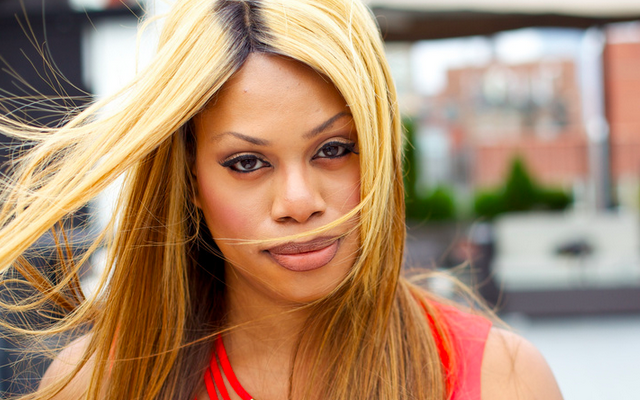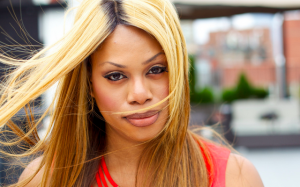‘Attitude’s Editor at Large Paris Lees thanks Laverne Cox
By Paris Lees

Hey Laverne,
I’m sure you’ve been inundated with kind messages over the past week, but you can never have too many of those so I’ve decided to add my congratulations to the pile. I say ‘congratulations’ but it’s more of a thank you note, really.
It’s been a week since I saw that you were on the cover of this month’s TIME magazine, celebrating a “tipping point” for transgender acceptance. I was overjoyed, of course I was, but I also felt something that I don’t, often: impressed. I was surprised, too, because just last month TIME surprised me and many others by not including you in its list of this year’s 100 most influential people. Despite huge public support for you. Didn’t you bag more votes than Bieber at one point? We expected to see you there and we didn’t. I thought it was odd and I still don’t know if it was an oversight or if TIME knew they were saving you up for something special? Either way, you’ve taken your rightful place now – and it feels like trans people worldwide are starting to take their rightful places with you.
You’re the first person to point out that this cover is bigger than you, but you’ve worked hard to get where you are today. I know that you are very grateful for the many wonderful things coming into your life now – many of which may be described as privileges. Hard won privileges. You’ve done reality TV, produced your own shows, taken roles here and there – and now you’re in a hit series. That isn’t easy. That isn’t chance. That doesn’t get handed to you on a plate. I know you’d never want to wallow in self-pity when so many people in our situation face so much hardship and violence. With this in mind, I’d like to say something I suspect you would never allow yourself to publicly admit: what you do is fucking tough.
I haven’t heard you complain. One of the most pleasing aspects of your success is the way you help your trans sisters, many of whom are, at best, forgotten by an indifferent society and, at worst, murdered, beaten and raped. People like Jane Doe and Monica Jones. I’m a Brit but I know about these American trans women of colour because you use your platform to shine a light on them. Good for you.
I don’t know what runs through your mind in the mornings but, if you are like many of the trans people I know, I suspect there’s still a part of you that sometimes questions whether it will be safe, or possible, to face the outside world each day.
I didn’t know if I could walk out the front door today. I dropped my travel card and it fell flat against the polished wooden floor; I was running late and I burst into tears. I worried about missing my train, being even more late to work than I already was, of being shouted at, crying, running out the office, humiliated. None of these things happened, by the way, but, in that moment, all I wanted to do was jump back into bed and pretend the world didn’t exist. I’m a strong woman, but I still have moments like this. I don’t know if you do too, but I know that after a lifetime of being told you are inferior it takes a whole lot of scrubbing to erase those stubborn traces of self-hatred and doubt.
To do what you do – to get up on a stage, behind a podium, in front of a camera – takes guts. It requires courage of anyone, but girls like us especially. I know you must worry about your appearance as much as the rest of us and how stressful life in the public eye can be when you know that people like us are judged particularly harshly not just on the things we say, but also the way we look, move and sound. Some people who have taken our journey are too scared to live their lives openly and challenge injustice and who can blame them? As we know, bigotry is never far away. You put yourself in the firing line and I salute you for it.
You’re kind of flawless though. You laugh. You charm. You move people. I was struck by many wise things you said when I interviewed you last year, but one thing in particular stuck with me. “I spend a lot of time,” you told me, “thinking about how I can construct a message so that people can hear it”. It’s working! You’re connecting with the mainstream and helping to spark a conversation across the United States and beyond.
I know you hate to be called a role model and prefer to be seen as a ‘possibility model’. I don’t wish to pressure you with oppressive praise. The expectation that we have to be perfect ambassadors is an unfair burden and you don’t have to be perfect. You can mess up one day. It’s fine. There is no right way to be trans and there is no instruction manual for how to change the world, but I want you to know that just by being you and doing what do so well, you are contributing to lasting change.
Laverne, what you have done is huge. Important. Groundbreaking. It means something. TIME did good and you did good and I imagine your collaboration will inspire many people, trans or otherwise, to pursue their dreams. Still, despite the love pouring into your inboxes right now, I don’t think you’ll truly appreciate how significant your TIME cover is for many years to come, because your success will have the biggest effect on those who are not yet able to thank you. We know how they might feel because we were just like them, once. They don’t have voices. They are frightened. They are desperate. They see the bad things that can happen to people like us, but if they see your TIME cover standing proud on newsstands they will also see hope. Silently watching your success, what you do, what is possible… truly, this will change lives.
 There have been trans people who have done great things well before either of us were born. And I know you are always keen to remember those that went before you, but none have combined your mainstream appeal with the rhetoric of emancipation you express so clearly – though of course we thank those who made it possible to move the dialogue forward. You’re an articulate woman, yes, but when I hear you speak it is not simply the words of one person but the language of a global movement for equality. You are political. You told me last year that your experiences of race and class inform the work you do to further transgender acceptance, having grown up in working class Alabama, and we know that these struggles overlap. Thankfully, the public is starting to accept that everyone deserves the same human dignity – because people like you are convincing them it is true.
There have been trans people who have done great things well before either of us were born. And I know you are always keen to remember those that went before you, but none have combined your mainstream appeal with the rhetoric of emancipation you express so clearly – though of course we thank those who made it possible to move the dialogue forward. You’re an articulate woman, yes, but when I hear you speak it is not simply the words of one person but the language of a global movement for equality. You are political. You told me last year that your experiences of race and class inform the work you do to further transgender acceptance, having grown up in working class Alabama, and we know that these struggles overlap. Thankfully, the public is starting to accept that everyone deserves the same human dignity – because people like you are convincing them it is true.
I look at you in a hit Netflix show, Janet Mock on the New York Times bestsellers list and Carmen Carrera modelling for David LaChapelle and, along with envy that sometimes turns me bright green, I see what is possible when we support each other as a community. As sisters. I hope we see more of this. The world is hostile enough for those of us who don’t conform to rigid ideas of who we’re supposed to be without fighting among ourselves. If we can nurture each other then more and more people like us can prosper – and when one person from our community raises themselves up, we are all raised up with them. And who would disagree that now is our time to rise up? All you need to do is look around. It’s happening.
Like you, while trying to discuss issues I believe are important to our community, I’m always keen to point out that I don’t speak on behalf of anyone but myself. On this occasion, though, I think I speak for many of us when I say how grateful we all are for you. Yes, we are also grateful for the people who run homeless shelters for young gay and trans people, and those who work behind the scenes to make the world a better place – and even just the friends who hold our hands through difficult journeys. But we are bloody grateful for you, too, Laverne, and I think you need to know. I also want our allies, of which there are more and more these days, to know what your success means to folk like us. Loads, in a word.
Thank you. And keep up the good work.
Paris x
Follow Paris Lees on Twitter @ParisLees.

